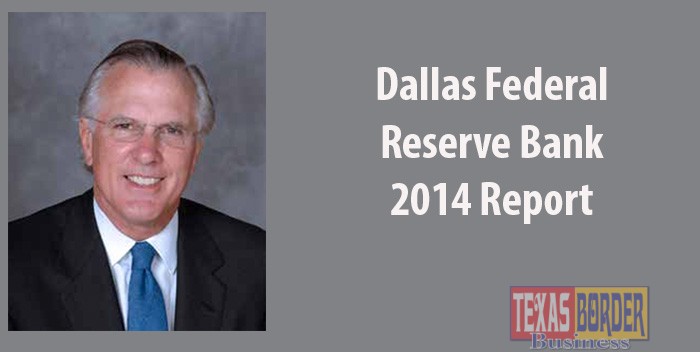
Texas Border Business –
Letter from the President
The Federal Reserve Bank of Dallas’ Globalization and Monetary Policy Institute has released its Annual Report for 2014.
In an introductory letter, Dallas Fed president and CEO Richard W. Fisher says globalization has lifted world living standards while challenging the work of monetary policy. Read Fisher’s introductory letter as well as the full report here:
When I took office as president of the Federal Reserve Bank of Dallas in April 2005, I mandated that the Research Department make the study of globalization and its implica- tions for monetary policy its top priority. Up to that point, the department had a strong emphasis on the study of Latin America, but I believed it important for the Reserve Banks to look beyond their immediate neighborhoods to think about economic developments on a global scale.
We created the Globalization and Monetary Policy Institute to leverage our local efforts in Dallas. As I prepare to step down as president of the Dallas Fed, I look back with great pride on all that the institute has accomplished.
There is no simple answer to the question of how globalization matters for U.S. monetary policy. When I began speaking about this issue,
a lot of the emphasis was on the disinflationary impact of the integration of large trading economies such as China into the global trading system.
We are now more confident that cheap imports of manufactured goods from China did play an important role in restraining headline inflation in the advanced economies for some time. But we also learned that the overall inflationary effect of the rise of China and other emerging market economies on inflation dynamics was more subtle due to the voracious demands of these countries for raw materials and commodities.
To some extent, the focus on the inflationary consequences of globalization was misplaced. Far more important—in light of subsequent developments—was the extraordinary growth of financial globalization. Prior to the recent global financial crisis, many worried about the global imbalances that were one manifestation of the growth of financial globalization. Others argued that imbalances were not an important concern, that international financial flows reflected the optimizing decisions of individual investors that presumably knew a lot more about what they were doing than did policymakers. Further, a consensus had emerged in the academic and central banking communities that inflation targeting sufficed to ensure macroeconomic stability.
We now know that the consensus surrounding inflation targeting was mistaken or, at a mini- mum, incomplete. Cross-border capital flows are not always benign, but rather have the potential to fuel unsustainable asset price bubbles that create challenges for central banks seeking to deliver on their mandates.
As I have noted on other occasions, the recent housing boom and bust in the United States would have ended sooner and with less dire consequences for the U.S. economy had it not been for our ability to borrow large amounts of money from foreigners.
Of course, while globalization has presented challenges for policymakers around the world, it has also brought enormous benefits to the citizens of the U.S. and every other country. Globalization has lifted hundreds of millions of people out of poverty and has done more to boost global living standards than any event since the Industrial Revolution of the late 18th and early 19th centuries.
The challenge for policymakers worldwide will be to manage the process of globalization so as to cement these gains and limit the destabilizing effects of greater global integration.
Major revolutions in economic theory are usually prompted by real world developments. The invention of macroeconomics as a field of study in the 1930s was prompted by the perceived inability of classical economics to account for the prolonged periods of high unemployment that many advanced economies experienced during the Great Depression.
The emergence of monetarism and the rational expectations revolution of the 1970s were likewise prompted by the inability of the postwar neoclassical synthesis to explain the simultaneous existence of high inflation and high unemployment during the Great Inflation. It is my belief that the Great Recession will likewise precipitate a major shift in the way economists think about the macroeconomy, toward a paradigm where finance and global linkages play a greater role than they do now.
I am very proud of the achievements of our Globalization and Monetary Policy Institute in contributing to advancing our understanding of this important phenomenon through the hundreds of working papers that have been circulated through its working paper series over the past seven years. This year’s institute annual report contains essays by three of the senior staff of the institute explaining how their individual research programs have helped advance our understanding of globalization, and I commend them to you highly.
Richard W. Fisher
President and CEO
Federal Reserve Bank of Dallas
Other Articles:
- Globalization: The Elephant in the Room That Is No More
- Understanding Trade, Exchange Rates and International Capital Flows
- Toward a Better Understanding of Macroeconomic Interdependence
- Summary of Activities 2014
- Micro-Foundations of International Trade, Global Imbalances and Implications on Monetary Policy
- The Political Economy of International Money: Common Currencies, Currency Wars and Exorbitant Privilege
- The Federal Reserve’s Role in the Global Economy: A Historical Perspective
- Institute Working Papers Issued in 2014
- Institute Staff, Advisory Board and Senior Fellows
- Research Associates












